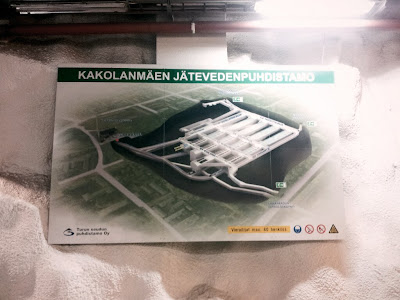For the last event of PURE project its partners have been invited to Turku on December 11th to visit Kakola wastewater treatment plant and the biogas plant of Biovakka.
This modern and the
third biggest in Finland WWTP has its facilities built-in the rock of Kakola
hill. The construction was completed in 2008, and now plant is serving the population
of 300 000 inhabitants in the Turku region. Despite being pretty costly
investment for the city, it replaced five existing plants. Kakola WWTP allows
more efficient effluent treatment, and due to this discharge to the sea is
reduced by 30-50 %. The heat energy of the sewage water is
transferred into distant heating energy (18 MW) and distant cooling energy (35
MW) in a special thermal pump owned by Turku Energy Ltd. During the excursion, PURE project specialists from
Poland, Latvia, Estonia and Germany traveled through the treatment process had
an opportunity to exchange ideas and discuss experiences with Kakola engineers.
Later the group
visited Biovakka’s Topinoja plant on Turku landfill, where the wastewater treatment sludge is treated and processed into biogas. This plant receives from
Kakkola WWTP approximately 60 000-80 000 tonnes of sludge annually, which
is undergone hygienisation (by heating the biomass in order to remove seeds and
pathogens), anaerobic digestion (carried out in a completely closed and
oxygen-free space), conversion of anaerobic digestion residues into recycled
nutrients, biogas desulphurisation and storage. Later biogas is used as an
environmentally friendly source of heat and electricity. Biovakka is also
responsible for the final deposition of recycled nutrients generated in the
process, and plans on producing biofuel in the near future.
Picture: scheme of Kakola WWTP
Author: Olena Zinchuk


